ANCIENT GREEK ASTROLOGY

astrological birth chart for Alexander the Great
The Egyptians refined the Babylonian system of astrology and the Greeks shaped it into its modern form. The Ancient Greeks were skeptical about astrology. They wondered, for example, why twins born under the same astrological conditions had different fortunes, and why animals weren't ruled by the same cosmic powers as humans. [Source: "The Discoverers" by Daniel Boorstin,∞]
Astrology as we know it originated in Babylon. It developed out of the belief that since the Gods in the heavens ruled man's fate, the stars could reveal fortunes and the notion that the motions of the stars and planets control the fate of people on earth. The motions of the stars and planets are mainly the result of the earth’s movement around the sun, which causes: 1) the sun to move eastward against the background of the constellations; 2) the planets and moon to shift around the sky; and 3) causes different constellations to rise from the horizon at sunset different times of the year.
In ancient times astrology and astronomy were the same thing. The Babylonians were the first people to apply myths to constellations and astrology and describe the 12 signs of the zodiac. The Egyptians refined the Babylonian system of astrology and the Greeks shaped it into its modern form. The Greeks and Romans borrowed some of their myths from the Babylonians and invented their own. The word astrology (and astronomy) are derived from the Greek word for "star."
The names and shapes of many the constellations are believed to date to Sumerian times because the animals and figures chosen held a prominent place in their lives. It is thought that if the constellations originated with the the Egyptians were would ibises, jackals, crocodiles and hippos — animals in their environment — rather than goats and bulls. If they came from India why isn’t there a tiger or a monkey. To the Assyrians the constellation Capricorn was “ munaxa” (the goat fish).
The Greeks added names of heroes to the constellations. The Romans took these and gave them the Latin names we use today. Ptolemy listed 48 constellations. His list included ones in the southern hemisphere, which he and the Mesopotamians, Egyptians, Greeks and Romans couldn’t see.
RECOMMENDED BOOKS:
“Hellenistic Astrology: The Study of Fate and Fortune” by Chris Brennan (2017) Amazon.com;
“Ancient Astrology” by Tamysn Barton (1994) Amazon.com;
“Astrology: A History” by Peter Whitfield (Abrams, 2001). Amazon.com;
“Magic in Ancient Greece and Rome” by Lindsay C. Watson Amazon.com;
“Magika Hiera: Ancient Greek Magic and Religion” by Christopher A. Faraone and Dirk Obbink (1997) Amazon.com;
“Ancient Philosophy, Mystery, and Magic: Empedocles and Pythagorean Tradition”
by Peter Kingsley (1997) Amazon.com;
“Arcana Mundi: Magic and the Occult in the Greek and Roman Worlds: a Collection of Ancient Texts” by Georg Luck (1985) Amazon.com;
“Curse Tablets and Binding Spells from the Ancient World” by John G. Gager (1999) Amazon.com;
“Ancient Greek Love Magic” by Christopher A. Faraone (2001) Amazon.com;
“Superstitious Beliefs And Practices Of The Greeks And Romans” by William Reginald Halliday (1886-1966) Amazon.com;
"Amulets and Superstitions: the Original Texts With Translations and Descriptions of a Long Series of Egyptian, Sumerian, Assyrian, Hebrew, Christian, ... With Chapters on the Evil Eye” by E A Wallis Budge (1857-1934) Amazon.com;
“Practitioners of the Divine: Greek Priests and Religious Officials from Homer to Heliodorus” by Dignas (2008) Amazon.com;
“The Oxford Dictionary of Classical Myth and Religion” by Simon Price and Emily Kearns (2003) Amazon.com;
“Ancient Greek Religion: A Sourcebook” by Emily Kearns (2010) Amazon.com;
“A Companion to Greek Religion” by Daniel Ogden (2007) Amazon.com;
Greek Zodiac
The word zodiac comes from a Greek word meaning, "The circle of animals". The animals representing the signs were placed among the stars usually for great acts of heroism. [Source: Whats-your-sign.com/zodiac-signs-and-meanings and spiffy-entertainment.com/zodiac]
Aries - The Ram (March 21 — April 19). Aries people are creative, adaptive, and insightful. They can also be strong-willed and spontaneous (sometimes to a fault). Aries people can be driven and are very ambitious often making them over-achievers in anything they set their mind to tackle. Aries are fire signs, and so too is their personality. They may be quick to anger, but don’t take it personally, it’s just their fiery, passionate personalities showing through. Aries signs have excellent sense of humor, and they get along with almost everyone at the party (and they DO know how to party). Aries can be impatient, but we love them anyway because they are devoted friends, lovers and family members — they are loyal to then end and will fight for their causes (usually supporting the underdog). See symbolic meanings of the Ram here. [Source: Whats-your-sign.com/zodiac-signs-and-meanings]
The origin of Aries stems from the tale of the Golden Ram. In a plot to trap the centaur Ixion, Hera created a woman looking nearly identical to herself out of a cloud and named her Nephele. She then forced King Athamus to marry this woman. This relationship didn't work out at all as Athamus became bored with Nephele fairly quickly and left her. Athamus almost immediately after this, married Ino. This of course angered Nephele, so she asked Hera for vengeance. Hera had no problem in doing this as she was already angry at Athamus and Ino already as a cause of them taking care of Dionysus for Zeus. Hera then proceeded to poison their minds and make them crazy. Athamus attempted to sacrifice his son by Nephele, Phrixius. This plot was thwarted when Heracles sent a Golden Ram to save him. When the ram brought Phrixius to his destination, he sacrificed the Golden Ram to Zeus and in turn, Zeus placed the mighty ram among the stars for his heroic deed. It is also from this ram that the Golden Fleece from the tale of Jason & the Argonauts came from. [Source: spiffy-entertainment.com/zodiac]
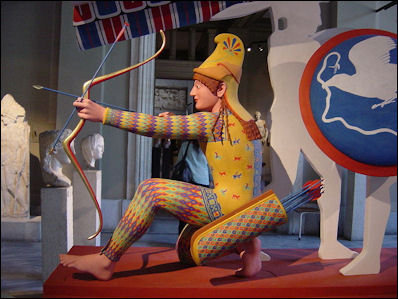
Aries Taurus - The Bull (April 20 — May 20). Taurus zodiac signs and meanings, like the animal that represents them, is all about strength, stamina and will. Stubborn by nature, the Taurus will stand his/her ground to the bitter end (sometimes even irrationally so). But that’s okay because the Taurus is also a loving, sympathetic and appreciative sign. The Taurus is very understanding and when we need someone to unburden ourselves to, we often share our deepest fears with the Taurians of the zodiac. Taurians are very patient, practical and efficient, they are excellent in matters of business and are also wonderful instructors/teachers. Although initially they may have their own best interest at heart, they are ultimately & endlessly generous with their time, possessions and love. [Source: Whats-your-sign.com/zodiac-signs-and-meanings]
The sign of Taurus stems from the Tale of Europa and the Bull. This is a tale of one of Zeus' many affairs. Zeus was extremely attracted to Europa and yearned for her affection. Zeus then appeared before Europa in the form of a magnificent white bull. Europa couldn't resist petting the bull, so she walked over to it and did just that. She then climbed upon the bull's back at which point the bull carried Europa across the sea to Crete where he then took the form of an eagle and, for a lack of better terms, raped her. In rememberance of this affair, Zeus placed the image of the bull amongst the stars. [Source: spiffy-entertainment.com/zodiac]
Gemini, Cancer and Leo
Gemini - The Twins (May 21 - June 20). Flexibility, balance and adaptability are the keywords for the Gemini. They are quick to grasp the meaning of a situation and act on it, often with positive effects. They tend to have a duality to their nature, and can sometimes be tough to predict how they will react. They can turn from hot to cold and may be prone to noticeable mood swings. However, they are generous signs with tendencies of being affectionate, and imaginative. They also inspire others easily as they seem to naturally motivate themselves — their charisma and accomplishments are infectious. Geminians are very supportive, and are especially good at promotions, sales, and driving hard bargains. [Source: Whats-your-sign.com/zodiac-signs-and-meanings]
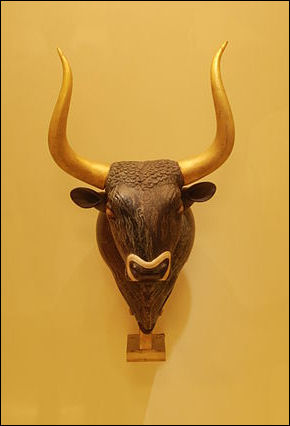
Taurus The Gemini sign stems from the Tale of Castor and Pollux. Castor and Pollux were half-brothers. Castor was born of Tyndareus and Leda, Pollux was born of the affair between Zeus and Leda (also known as the Tale of Leda and the Swan). The twins grew inseperable as time went on. One day, Castor was killed in a battle. Pollux was so grief stricken that he took his own life to join his brother at death. In honor of the brothers' great love, Zeus placed them among the stars. [Source: spiffy-entertainment.com/zodiac]
Cancer - The Crab (June 21 — July 22). Cancerians love home-life, family and domestic settings. They are traditionalists, and enjoy operating on a fundamental level. They love history, and are fascinated with the beginnings of things (heraldry, ancestry, etc.). The moon is their ruler, so they can be a bit of a contradiction and sometimes moody. However, they are conservative, so they’ll be apt to hide their moods from others altogether. They have a reputation for being fickle, but they’ll tell you that isn’t true, and it’s not. Cancerians make loyal, sympathetic friends. However Cancerians need alone time, and when they retreat, let them do so on their terms. The sign of Cancer stems from one of the 12 Trials of Heracles. While battling the Hydra, Hera sent down a giant crab to thwart his efforts. The crab was only a nuisance at most as Heracles simply crushed the crab under his foot just before he defeated the Hydra. Hera honored the crab's attempt at stopping her most hated of Zeus' children by placing it amongst the stars. [Source: Whats-your-sign.com/zodiac-signs-and-meanings and spiffy-entertainment.com/zodiac]
Leo - The Lion (July 23 — August 22). The zodiac signs and meanings of Leo is about expanse, power and exuberance. Leos are natural born leaders, and they will let you know it as they have a tendency to be high-minded and vocal about their opinions. That’s okay, because if you observe, the Leo is usually correct in his/her statements. Leos have a savvy way of analyzing a situation and executing swift judgment with a beneficial outcome. It comes from being a leader. They are brave, intuitive, and also head-strong and willful. Beneath their dynamic persona lies a generous, loving, sensitive nature that they do not easily share with others. They might be a bit bossy, but those who know them understand this comes from a source need to do good, not (usually) from an inflated ego. The sign of Leo stems from yet another of Heracles 12 trials. Leo of course represents the Lion of Nemea which was Heracles' first trial. The lion couldn't be defeated by any weapon. Heracles eventually battled the lion hand to hand (or maybe paw) and strangled the lion to death. In rememberance of the grand battle, Zeus placed the Lion of Nemea amongst the stars. [Source: Whats-your-sign.com/zodiac-signs-and-meanings and spiffy-entertainment.com/zodiac]
Virgo, Libra and Scorpio
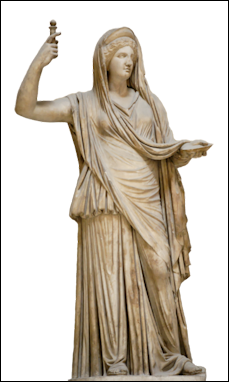
Virgo Virgo - The Virgin (August 23 — September 22). Virgos have keen minds, and are delightful to talk with, often convincing others of outlandish tales with ease and charm. Virgos are inquisitive and are very skilled at drawing information from people. This trait also makes them naturally intuitive. Combine this with their remarkable memories, and we see an advanced, analytical personality. However the Virgo needs balance in their lives otherwise they may become short-tempered, impatient and self-serving. Virgos are excellent teammates in work and social activities. They work well with others, although they freely express their opinions (even when unwarranted). [Source: Whats-your-sign.com/zodiac-signs-and-meanings]
One of the few signs not represented by an animal, Virgo's origin stems from the Tale of Pandora. Virgo of course is the representation of the goddess of purity and innocence, Astraea. After Pandora opened the jar and let loose all the evil's unto the world, the gods who lived on the earth fled back to the heavens and away from the evil's of the earth. Astraea was the last to return to the heavens. As a rememberance of innocence lost, Astraea was placed amongst the stars in the form of Virgo. [Source: spiffy-entertainment.com/zodiac]
Libra - The Scales (September 23 — October 22). As their zodiac signs and meanings would indicate, Libras are all about balance, justice, equanimity and stability. They easily surround themselves with harmony and beauty, but sometimes go to extremes to do so if their goals are unreasonable or unhealthy. With Venus as their ruling planet, Libras are very understanding, caring, and often the champion of underdogs. They have keen intuitions, but often don’t give themselves enough credit for their perceptions. They can be quiet and shy if not persuaded to come out of their shell. Ironically and in spite of their introverted nature they make excellent debaters, often proving a point from out of seemingly nowhere. Libra are the scales that balance justice. They are held by the goddess of devine justice, Themis. Why exactly she is placed among the stars I haven't yet found out, but it is interesting that Libra shines right beside Virgo which represents Astraea, daughter of Themis. [Source: Whats-your-sign.com/zodiac-signs-and-meanings and spiffy-entertainment.com/zodiac]
Scorpio - The Scorpion (October 23 — November 21). The Scorpio is often misunderstood. These personalities are bold and are capable of executing massive enterprises with cool control and confidence. They can surmount seemingly all obstacles when they put their mind to the task, and they have unshakable focus when the situation calls for it. Regardless of their bold nature, they are often secretive, but they are always observing behind their withdrawn manner. Being associated with a solar animal, (the scorpion) they are not withdrawn for long, and when they come out again they do so with force, vigor and determination. It is true, Scorpios can be argumentative and pack a powerful sting, but that’s simply because they see all opposition as a healthy challenge. [Source: Whats-your-sign.com/zodiac-signs-and-meanings]
The sign of Scorpio stems from the Tale of Orion. Orion was the son of Poseidon and Euryale. Orion was also a favored hunting partner by Artemis which made her brother Apollo very envious. Apollo pleaded to Gaea to create a giant scorpion to kill Orion. Gaea obliged, and the scorpion stung and killed great Orion. In rememberance of this struggle, Zeus placed Orion and the scorpion amongst the stars. [Source: spiffy-entertainment.com/zodiac]
Sagittarius, Capricorn, Aquarius and Pisces
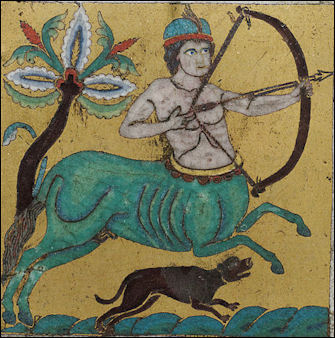
Sagittarius Sagittarius - The Centaur (November 22 — December 21). Here we have the philosopher among the zodiac signs and meanings. Like the Scorpio, they have great ability for focus, and can be very intense. However, they must channel their energy or they will waste time and wear themselves out going in too many directions at once. They are not very patient and expect quick results. However, when encountered with failure they make extreme comebacks often against incredible odds. They make loyal friends and lovers, but they do not handle commitment well as they refuse to be tied down while chasing philosophical pursuits. [Source: Whats-your-sign.com/zodiac-signs-and-meanings]
The Sagittarius sign is representative of the centaur, Cheiron. Cheiron was a friend of many great hero's in Greek mythology such as Achilles and Heracles. Speaking of Heracles, some friend he turned out to be. While hunting, Heracles accidently shot Cheiron in the leg with a poison arrow. Cheiron was immortal so he couldn't die, he just had to take the unending pain. Heracles promised to help him somehow. Upon his ventures, Heracles came upon Prometheus who was trapped with no way of escape. The only way Prometheus could be set free was for someone else to take his place. Cheiron wanted only to be relieved of his insufferable pain, so he took Prometheus' place and died. In honor of the noble act, Zeus placed Cheiron amongst the stars. [Source: spiffy-entertainment.com/zodiac]
Capricorn - The Goat (December 22 — January 19). Capricorns are also philosophical signs and are highly intelligent too. They apply their knowledge to practical matters, and strive to maintain stability and order. They are good organizers, and they achieve their goals by purposeful, systematic means. They are very intuitive, although they don’t share this trait with others freely. They do not deal well with opposition or criticism but a healthy Capricorn will often shrug off negative comments towards their character. They are patient and persevering — they know they can accomplish any task as long as they follow a their plan step-by-step. Capricorns have broad shoulders, and typically take on other’s problems with aplomb. Ironically, they rarely share their own problems and tend to go through bouts of inner gloom after a spell of dwelling on these problems. The sign of Capricorn represents the goat Amalthea who fed the infant Zeus. It's said that Zeus placed her among the stars in gratitude. Other accounts say that Capricorn represents Pan, the god of the forest, woodlands, and nature. [Source: Whats-your-sign.com/zodiac-signs-and-meanings and spiffy-entertainment.com/zodiac]
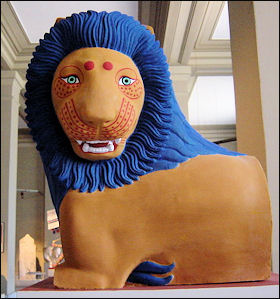
Leo Aquarius - The Water Bearer (January 20 — February 18). Often simple and unassuming, the Aquarian goes about accomplishing goals in a quiet, often unorthodox ways. Although their methods may be unorthodox, the results for achievement are surprisingly effective. Aquarians will take up any cause, and are humanitarians of the zodiac. They are honest, loyal and highly intelligent. They are also easy going and make natural friendships. If not kept in check, the Aquarian can be prone to sloth and laziness. However, they know this about themselves, and try their best to motivate themselves to action. They are also prone to philosophical thoughts, and are often quite artistic and poetic. The sign of Aquarius stems from the Tale of the Deucalion Flood. In this tale, Zeus pours all the waters of the heavens onto earth to wash away all the evil beings. Deucalion and Pyrrha then threw stones over their shoulders and created a new race of mankind. [Source: Whats-your-sign.com/zodiac-signs-and-meanings and spiffy-entertainment.com/zodiac]
Pisces - The Fish (February 19 — March 20) Also unassuming, the Pisces zodiac signs and meanings deal with acquiring vast amounts of knowledge, but you would never know it. They keep an extremely low profile compared to others in the zodiac. They are honest, unselfish, trustworthy and often have quiet dispositions. They can be overcautious and sometimes gullible. These qualities can cause the Pisces to be taken advantage of, which is unfortunate as this sign is beautifully gentle, and generous. In the end, however, the Pisces is often the victor of ill circumstance because of his/her intense determination. They become passionately devoted to a cause — particularly if they are championing for friends or family. Pisces represents the goddess of love & beauty, Aphrodite and the god of love, Eros. While taking a stroll down the Euphrates River, they had an encounter with the vicious Typhon. They pleaded to Zeus to help them escape, so Zeus changed the two into fish and they swam away to safety. In rememberance of this, Athena placed the twin fishes amongst the stars. [Source: Whats-your-sign.com/zodiac-signs-and-meanings and spiffy-entertainment.com/zodiac]
Image Sources: Wikimedia Commons, The Louvre, The British Museum
Text Sources: Internet Ancient History Sourcebook: Greece sourcebooks.fordham.edu ; Internet Ancient History Sourcebook: Hellenistic World sourcebooks.fordham.edu ; BBC Ancient Greeks bbc.co.uk/history/; Canadian Museum of History, Perseus Project - Tufts University; perseus.tufts.edu ; MIT Classics Online classics.mit.edu ; Gutenberg.org, Metropolitan Museum of Art, National Geographic, Smithsonian magazine, New York Times, Washington Post, Live Science, Discover magazine, Natural History magazine, Archaeology magazine, The New Yorker, Encyclopædia Britannica, "The Discoverers" and "The Creators" by Daniel Boorstin. "Greek and Roman Life" by Ian Jenkins from the British Museum, Wikipedia, Reuters, Associated Press, The Guardian, AFP and various books and other publications.
Last updated September 2024
